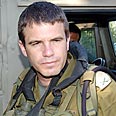
General resigns following inquiry into war
Galilee Division commander, who was to be promoted and appointed as head of strategy division, informs army chief has decided to resign from IDF after inquiry into Lebanon war failures points to inadequate conduct on day soldiers were kidnapped by Hizbullah
The dramatic announcement was made at the start of a special General Staff meeting regarding the inqury into the soldiers' abduction.
Hirsch clarified in his meeting with Halutz that he would not take back his resignation but will stay with the Galilee Division until his replacement can take over.
In recent IDF discussions it was agreed that Brig. Gen. Imad Fares will succeed Hirsch, the decision has yet to be authorized by Defense Minister Amir Peretz.
Hirsch was considered one of the most esteemed officers among the IDF's top brass. His resignation brought a long career to an end.
Halutz asked Hirsch to go back on his resignation, but the commander refused.
In a resignation letter submitted to Halutz, Hirsch noted that from the beginning of the war he received no backing and was defamed the entire time.
"This is not the way to treat a commander," he wrote, adding that the IDF and the State of Israel were the essence of his life and that he was part of the military establishment since he was 14 years old.
Hirsch asked that the appointments of other division commanders are not harmed, and said that he made the decision to resign as the recent period was very difficult both to him and his family - however, he added is proud to have had the right to defend the country.
"I am responsible for what takes place in my region and under my command. I have no need to 'take responsibility,' I have never given it to anyone," the commander wrote, claiming that the 91st division was well prepared for war.
'Not an admission of failure'
He harshly criticized the inquiries into the war: "I find that the inquiry into the kidnapping incidents was carried out as an objective and agenda-oriented inquiry. The contexts in it are weak and lacking, and although there are several conclusions I agree with, I cannot accept its essence, its way of analysis and fundamental details in it."
The commander also noted that he had revealed the entire truth regarding the events he took part in. As a person who is familiar with the military establishment's conduct, he believes that he cannot influence in a significant way anymore, hinting to the fact that he realized the inquiry recommends not to promote him.
The responsibility during the war, he claimed, lies not only on the field units, but on the top ranks as well.
"I believe it would be right to rule that real responsibility for errors, malfunctions and failures lies not only in the end units and their commanders. Such responsibility should be claimed by top ranks."
The inquiry into the incident in which IDF soldiers Ehud Goldwasser and Eldad Regev were kidnapped and eight were killed was held by Major General (res.) Doron Almog.
The inquiry pointed to inadequate conduct of the soldiers in the field and the entire alignment, and also called for personal conclusions – including against the division commander himself.
Sources close to Hirsch told Ynet on Sunday morning that his decision to resign was not an admission of failure, but a decision made in light of the circumstances created.
"Hirsch did everything he knew throughout the years, and also during the war, he acted according to the values he was brought up on – and only one objective stood before his eyes: To do anything in order to protect the citizens of the State of Israel.
"He will continue to fight for his reputation, even if this takes place after he takes off his uniform," a source said.
Third one to go
Brigadier General Hirsch began his military career at the paratroopers division. He served as the Binyamin Division commander, as well as the commander of the officers' school. He was appointed Galilee Division commander on April 2005.
Hirsch was harshly criticized during the war, when he announced to the media that the IDF had obtained control in the southern Lebanese town of Bint Jbeil, a day before the difficult incidents in the Shiite town which claimed the lives of eight Golani soldiers.
The inquiry held by Majot General (res.) Yoram Yair regarding the division's conduct during the war did not include recommendations for personal conclusions, contrary to Almog's inquiry into the kidnapping itself.
IDF Chief of Staff Dan Halutz had ruled last month that the four commanders of the military divisions that took part in the recent war in Lebanon will not be dismissed from their positions, despite the findings of inquiries conducted after the ceasefire went into force that revealed failures in their conduct.
Some of the generals will continue to serve in their roles, while others will be appointed to administrative posts after completing serving their term in office.
During a prolonged debate held throughout the afternoon at the office of Dan Halutz and attended by army generals, it was decided that Brigadier-General Gal Hirsch, will complete his term in office and afterwards be appointed head of the Strategy Unit at the IDF's Planning Directorate.
Defense Minister Amir Peretz's announced however that he had decided to delay the issue and not to automatically authorize the appointments. The word in the IDF was that if the appointments are not authorized, "officers will announce their immediate resignation."
Hirsch was the third general to leave since the war, following Northern Command Chief Major General Udi Adam and Operations Officer Colonel Boaz Cohen.
His decision is an embarrassment for the chief of staff, who asked to promote him and was turned down – at least temporarily – by the defense minister.










